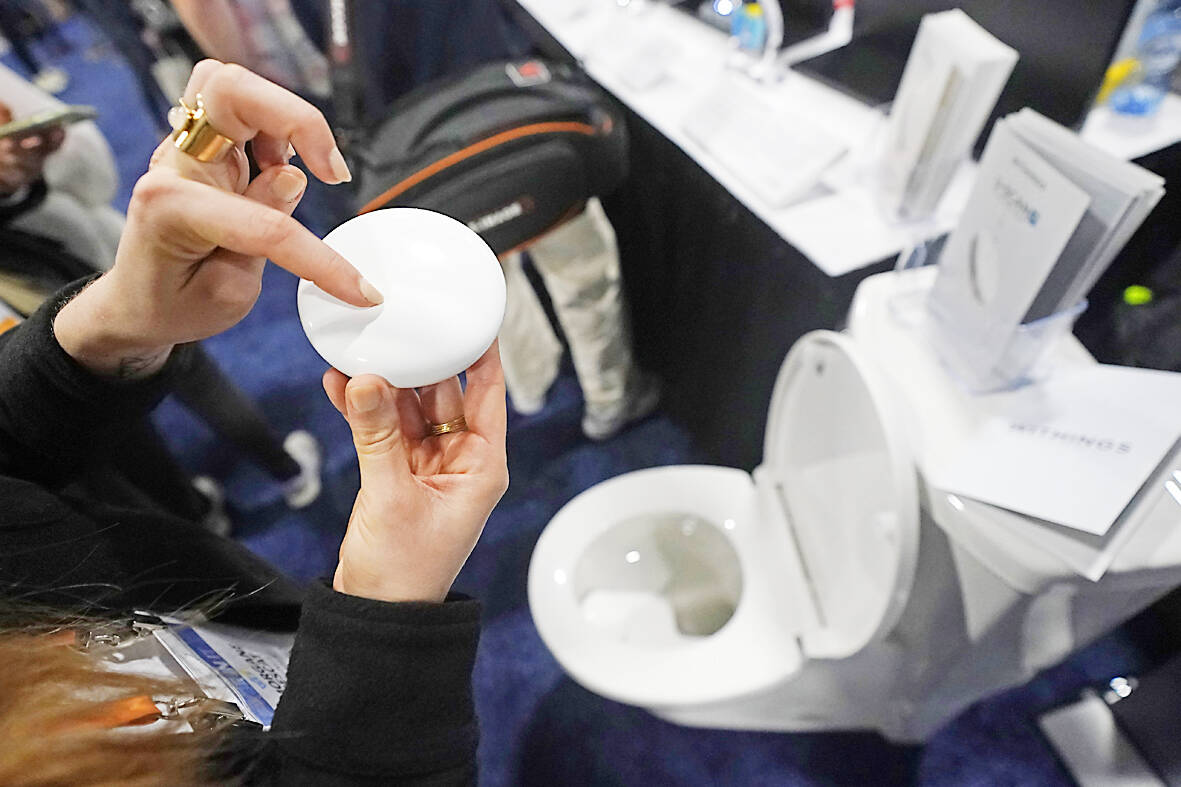Pillows that stifle snores, urine-testing toilets and “digital twins” for safer surgeries were all on display at a CES gadget fest in Las Vegas Tuesday, ahead of the opening of the consumer electronics extravaganza.
Fueled by the pandemic, a rising trend in remote or home healthcare innovations is expected to be one of the major themes at the annual CES gathering.
“We are going to see some really interesting health gadgets that monitor or improve your well-being,” Avi Greengart, a technology analyst with Techsponential, said of the show.

Photo: Reuters
SNORE-SILENCING PILLOW
South Korea-based 10Minds showed off a pillow with a built-in microphone that detects snoring, then triggers soundless airbags that change size to gently turn a sleeper’s head to a position that makes it easy to breathe quietly.
“When you start snoring, right away it detects it,” company representative Daehyun Kim said at the CES Unveiled event.

Photo: AP
“It even distinguishes your snoring from your dog snoring, or your spouse.”
The pillow, which syncs with a smartphone app, collects data which is analyzed to identify snoring patterns to hone its response over time, Kim added.
“It’s (a) very simple solution,” Kim said.
TOILET TURNED LAB
Digital health and wellness company Withings was at Unveiled with a U-Scan device that lets people analyze their urine by peeing as they normally might into a toilet.
A disk that hangs inside a toilet bowl can house changeable cartridges, one of which monitors a woman’s menstruation cycle and another of which measures nutritional health indicators such as vitamin C and ketone levels.
“It helps people monitor their metabolic intake to optimize their daily hydration and nutrients,” the French company said in a release.
“It recommends workouts, dietary suggestions and recipes to achieve identified goals.”
The in-toilet device syncs wirelessly to a smartphone app.
U-Scan can even distinguish between various users based on “an individual’s urine stream signature,” according to the company.
Withings will debut U-Scan in Europe in the second quarter of this year, at a price of 500 euros for a starter kit.
DIGITAL TWIN
France-based Abys displayed technology that enables surgeons to create “digital twins” of patients using data from X-rays and other standard medical scans.
Surgeons can then precisely plan an operation, reducing the time it takes and the risk involved, company co-founder Arnaud Destainville said.
In operating rooms, surgeons can use Microsoft HoloLens mixed reality headsets to access a patient’s hologram “twin” and other data as they work, Destainville said.
“All the planning, all the information becomes available during the surgery,” Destainville said.
ARMCHAIR MASSEUSE
South Korean company Bodyfriend is taking aim at neck and back aches caused by sitting hunched over screens.
A Bodyfriend massage chair billed as a medical device kneads muscles, applies heat and even pulses electromagnetic waves that are supposed to ease aches and pains.
“Our technology helps solve problems created by technology” since spending time on one’s phone and other screens can create back problems, said Bodyfriend North America manager Changjoo Kim.

The Lee (李) family migrated to Taiwan in trickles many decades ago. Born in Myanmar, they are ethnically Chinese and their first language is Yunnanese, from China’s Yunnan Province. Today, they run a cozy little restaurant in Taipei’s student stomping ground, near National Taiwan University (NTU), serving up a daily pre-selected menu that pays homage to their blended Yunnan-Burmese heritage, where lemongrass and curry leaves sit beside century egg and pickled woodear mushrooms. Wu Yun (巫雲) is more akin to a family home that has set up tables and chairs and welcomed strangers to cozy up and share a meal

Dec. 8 to Dec. 14 Chang-Lee Te-ho (張李德和) had her father’s words etched into stone as her personal motto: “Even as a woman, you should master at least one art.” She went on to excel in seven — classical poetry, lyrical poetry, calligraphy, painting, music, chess and embroidery — and was also a respected educator, charity organizer and provincial assemblywoman. Among her many monikers was “Poetry Mother” (詩媽). While her father Lee Chao-yuan’s (李昭元) phrasing reflected the social norms of the 1890s, it was relatively progressive for the time. He personally taught Chang-Lee the Chinese classics until she entered public

Last week writer Wei Lingling (魏玲靈) unloaded a remarkably conventional pro-China column in the Wall Street Journal (“From Bush’s Rebuke to Trump’s Whisper: Navigating a Geopolitical Flashpoint,” Dec 2, 2025). Wei alleged that in a phone call, US President Donald Trump advised Japanese Prime Minister Sanae Takaichi not to provoke the People’s Republic of China (PRC) over Taiwan. Wei’s claim was categorically denied by Japanese government sources. Trump’s call to Takaichi, Wei said, was just like the moment in 2003 when former US president George Bush stood next to former Chinese premier Wen Jia-bao (溫家寶) and criticized former president Chen

President William Lai (賴清德) has proposed a NT$1.25 trillion (US$40 billion) special eight-year budget that intends to bolster Taiwan’s national defense, with a “T-Dome” plan to create “an unassailable Taiwan, safeguarded by innovation and technology” as its centerpiece. This is an interesting test for the Chinese Nationalist Party (KMT), and how they handle it will likely provide some answers as to where the party currently stands. Naturally, the Lai administration and his Democratic Progressive Party (DPP) are for it, as are the Americans. The Chinese Communist Party (CCP) is not. The interests and agendas of those three are clear, but